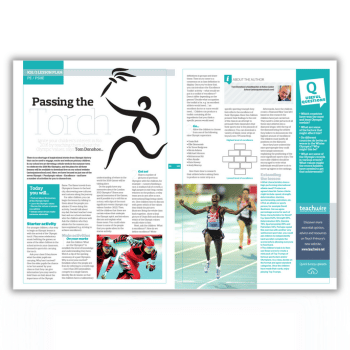“Like Boiling A Frog” – ATL’s Nansi Ellis Talks Teacher Workload

Later this spring, we’ll hear the results of the government’s ‘Reducing teachers’ workload‘ initiative. Here, Nansi Ellis – ATL Assistant General Secretary with responsibility for policy – talks to us about the union’s activities in this area, and the working practice she’d change tomorrow if she had the chance… Have you seen any indication that […]

Later this spring, we’ll hear the results of the government’s ‘Reducing teachers’ workload‘ initiative.
Here, Nansi Ellis – ATL Assistant General Secretary with responsibility for policy – talks to us about the union’s activities in this area, and the working practice she’d change tomorrow if she had the chance…

Have you seen any indication that the government’s three teacher workload review groups (on marking, planning and data management) will make a difference? The unions are all represented on those working groups, and we’ve so far had five meetings out of six. The groups are now pulling together some suggestions on what the government can do to address workload, and I think they will all come out with some intersting recommendations.
My concern is that a lot of what needs to happen is at government level. The groups will be reporting back at a time when we’ve got exams that haven’t been accredited yet, and where teachers don’t yet know what the testing at KS2 is going to look like or how it will be scored. Unless some of that changes – and unless inspections change more radically – workload will continue to be high.
Are there any practical solutions to the workload issue, or are the demands currently expected of teachers a ‘new normal?’ I don’t think it can be a ‘new normal,’ because teachers are falling over under [the strain]. We believe the workload issue is driving the current recruitment crisis – we’re not retaining teachers, because they’re coming in and burning out, and we’re not attracting teachers to the profession because the workload’s so heavy.
But it’s not just that the workload’s heavy – we’re concerned that much of it’s pointless, generated by having to write everything down in case Ofsted visits.
Schools will look at each other’s Ofsted reports, notice an inspector’s positive comments about, say, a nearby school’s marking system and suddenly think they’d better focus on that, because ‘That’s what’s Ofsted’s asking for’. There’s also league tables and the ‘data is king’ stuff. Until some of that is rebalanced, teacher workload is going to remain huge.
How many hours would you say constitutes a realistic working week for teachers? It’s hard to say ‘teachers should have an x-hour week – but having said that, I think a regular 60-hour working week is completely out of kilter with having any kind of private life. If the work makes sense and helps children, then teachers will do it. The problem is that a lot of what of what they’re doing is pointless paperwork for showing to somebody else. That’s what we need to stop.
If every weekend you’re spending half of both days marking, planning and doing other school work, that can’t be right. You need to be able to see your own children, do what you want to do in some of your own time – even with the a six-week summer holiday (though you’re likely to be spending a lot of that doing work as well).
If a teacher is thinking of quitting because of workload, what can they do? We have a workload tracker, which helps teachers identify what they’re doing in their work time and quantify it. Part of what we’re doing with the ATL’s workload campaign is encouraging teachers and other school staff to get together, talk to each other about whether their workload is causing them issues, and if so, why.
Individuals can do some things on their own, but as a school you could say ‘We’re going to have one staff meeting a fortnight and provide other information via alternative means’ – that would free up time. We’re encouraging our members to take a collaborative approach to helping each other to reduce workload.
In your view, how has the workload issue evolved or developed over time? Workload’s always been a bit of an issue – when you work with children and young people, there’s always more you can do to make things better.
Part of the problem right now is the enormous amount of change that’s happened over the last three or four years. We’ve had a new national curriculum for all year groups, we’ve got new tests in primary school, new KS2 tests, a proposal for new KS1 tests, phonics tests at age 7. At secondary, we’re now in the second year of changes to GCSE with a third year to come – I think that’s part of what’s tipped people over the edge.
The other part of it is the accountability regime. Because numbers have tightened in terms of things like floor standards and what happens if schools fail to reach them, people have become much more focused on those numbers, which is not a good proxy for children’s education.
People have used the ‘boiling a frog’ metaphor – NQTs entering the profession are asking themselves why this is, but if you’ve been in the profession for a long time, it’s just gradually got worse.
Are there any ways in which schools themselves might be compounding the problem? If you look at marking, for instance, there are good reasons for why schools might use a ‘triple-marking’ approach, where a teacher writes a comment on a piece of work, the pupil writes something back and the teacher comments on the pupil’s response.
It’s based on the idea that children engaging with feedback is really important – that if you explain something to a child, you want them to understand and do that thing differently next time. What then happens is that somebody, possibly at school level, makes it the norm for every piece of work. If you listen to the researchers and proponents of this marking approach, that was never the original intention, but it can escalate. Schools start to think that if somewhere down the road is doing it, than they’d better do it too.
There comes a point where teachers have to start asking questions – why are we actually doing these things? Are they making a difference? Is it worth the pain? And if it’s not, should we stop and rethink our approach?
If you had the power, which working practice would you abolish tomorrow? I would say to government, ‘Just back off with all the changes.’ That would be helpful – but the other thing I’d call for is the abolition of Ofsted inspections for individual schools.
We have a vision statement on inspection in schools [PDF] that talks about locally-led accountability practices that are nationally validated – so it’s not just people doing their own thing – and changing the inspection process, so that it’s about learning and support for learning, rather than judging.
For more information, visit www.atl.org.uk or follow @atlunion











